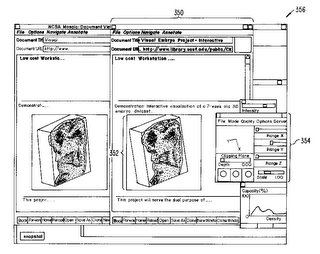
IF AT FIRST YOU DON'T SUCCEED . . . MICROSOFT TAKES A SECOND CRACK AT INVALIDATING THE EOLAS PATENT: On December 22, Microsoft submitted a second reexamination request with the USPTO, asking the Office to invalidate the '906 patent, and to put the brakes on the first reexamination request ordered by the USPTO commissioner in 2003. In the first reexamination proceeding, the USPTO indicated last September that the Eolas patent would stand, and that a reexamination certificate would be issued (the first reexamination proceeding can be viewed here).
Now, Microsoft is claiming that Eolas "withheld" prior art references from the USPTO. Specifically, Microsoft submitted multiple publications that were made over the Internet via a "www-talk email distribution list," some of which were posted by inventors named in the '906 patent.
During the first examination proceeding, Eolas successfully argued that the cited art did not render the patent obvious, because certain features (i.e., interactive processing of foreign-format data) were not expressly disclosed. However, Microsoft claims that the missing features were well-known in the art, and Eolas knew it as well. Specifically, Microsoft argued that the newly-cited publication directly addresses the "gaps" identified by the Examiner in the reexam. Moreover, the new publication actually "incorporates, responds to, and expands" on the prior art that was before the examiner. This publication was allegedly introduced during litigation, but was never submitted to the patent office by Eolas.
Furthermore, Microsoft introduced another publication authored by two of the named inventors that "discussed at length" the subject matter of the '906 patent. This publication occurred more than 1 year prior to the filing of the '906 patent, and Microsoft asserts it invalidates the patent under 102(b).
View the second reexamination request here.
Side note: in February 2005, the USPTO changes the reexamination rules, stating that a second or subsequent request for reexamination will be ordered only if that old prior art raises a substantial new question of patentability which is different than that raised in the pending reexamination proceeding. If the old prior art cited (in the second or subsequent request) raises only the same issues that were raised to initiate the pending reexamination proceeding, the second or subsequent request will be denied (see notice here).
Thursday, January 05, 2006
Subscribe to:
Post Comments (Atom)





Post a Comment